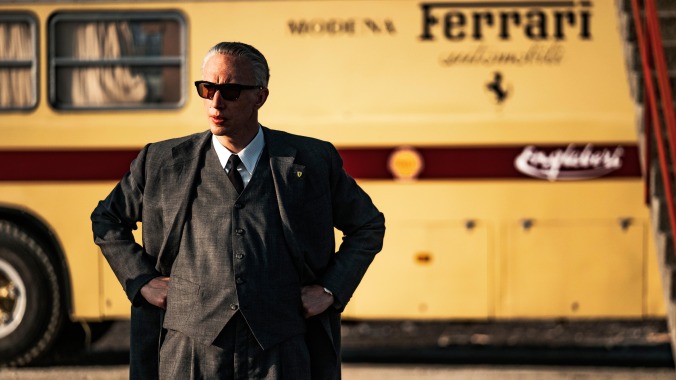Ferrari review: Michael Mann mythologizes motorsports and manhood
Adam Driver stars as a man driven by craftsmanship and ego to create success despite devastation

With Ferrari, director Michael Mann pops the hood and takes a look at the engine powering one man’s journey towards icon status during a tumultuous time. Through this titular, fallible protagonist, the audacious auteur explores many of his favorite recurring themes about the male identity, ruminating on men’s specialized skillsets, strengths, and vulnerabilities—especially when it comes to relationships with women. He also adds a kinetic, combustible beauty within gripping action sequences that put us in the driver’s seat as we ogle that gloriously seductive signature racing red.
Once a preeminent race car driver, Enzo Ferrari (Adam Driver) is having a tough go of it as an entrepreneur in 1957. It’s been 10 years since he opened a factory in the rubble of post-war Italy with his wife Laura (Penélope Cruz), and their business manufacturing personal and professional sports cars is on the verge of collapse. Their marriage is also in shambles due to the recent death of their terminally ill 24-year-old son Dino (who’s incidentally named after Enzo’s deceased brother and father). Plus Enzo’s been leading a secretive second life with mistress Lina Lardi (Shailene Woodley) and their young son Piero (Giuseppe Festinese). His abrasive mother Adalgisa (Daniela Piperno) makes no secret about her judgment of him, cruelly uttering, “The wrong son died.”
Business manager Cuoghi (Giuseppe Bonifati) advises Enzo that if he doesn’t find an investor soon, he’ll be bankrupt. A partnership with another company would allow him to carry on his obsession with creating the perfect race car while manufacturing hundreds of consumer cars. However, he must take control of Laura’s shares in the business, as well as win the Mille Miglia—a treacherous, high-pressure, multi-driver race through the Italian countryside—to attract the capital in the first place. And even if he can, he’s reticent to cede any power to another corporation. Plus he’s breaking in a new headstrong driver, Alfonso De Portago (Gabriel Leone), and facing a battle with Laura, whose grief has turned corrosive.
Tooling around in the territory Mann and screenwriter Troy Kennedy Martin map out is deeply fascinating. The adaption of Brock Yates’ novel “Enzo Ferrari: The Man, The Cars, The Races, The Machine,” starts at a place of palpable loss that allows Enzo to experience a precision-calibrated ascension over the course of the picture. Strategic character construction reveals a dichotomous man chasing the myth of perfection in his professional career while his personal life is a sloppy mess of self-styled entanglements. The film takes a blessed reprieve from becoming a stereotypical hagiography, as the filmmakers spotlight their subject’s human frailty and foibles without romanticizing them, and also take a sharp left turn during the alarmingly visceral, gory climax that wraps up this package in a fittingly untidy bow.
 Keep scrolling for more great stories.
Keep scrolling for more great stories.
